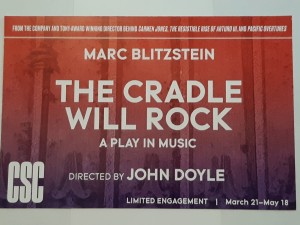Theater Review: The Cradle Will Rock
If, like me, you have only seen parts of Marc Blitzstein’s 1937 pro-labor play “The Cradle Will Rock”, such as those depicted in the 1999 Tom Robbins film called “Cradle Will Rock”, you can now enjoy the entire play, which is being performed at Classic Stage Company, 136 East 13th Street, in New York City, but it runs only until May 18, 2019.
Set in “Steeltown, USA”, the fast-paced quasi-operatic musical play runs fewer than 90 minutes (with no intermission) and illustrates how town boss “Mr. Mister” has corrupted the press, clergy, judicial system and other institutions with money and muscle, but may have met his match in union organizer “Larry Foreman”.
The play’s back story, a memorable part of theater history, involved the original Orson Welles– John Houseman production for the New Deal’s “Federal Theatre Project”, which was shut down in mid-June, 1937, shortly before the show was to open on Broadway. A new theater was found and the show went on, with Blitzstein playing his score on a solo onstage piano, and cast members performing their parts from the house (the audience), due to actors’ union restrictions. The spirit of the original show is captured to some extent by the use of an onstage piano, a small stage surrounded by a close-in audience, and a cast member who sits now and then on the lap of an audience-member.
The original play made its debut at a tense moment in U.S. labor history, during the violent campaigns to organize “Little Steel” industries and just weeks after the “Memorial Day Massacre”, when Chicago policemen killed ten people and injured many more for attempting to picket near the Republic Steel mill. This labor strife may have provided the true motivation for the attempt to suppress the play, rather than the stated claim that WPA budget cuts were necessary. In any case, the content and context for “The Cradle Will Rock” are part of labor history, and I encourage you to see the show.
Theater Review by Keith Danish, Book Review Editor of the New York Labor History Association

